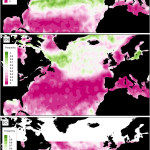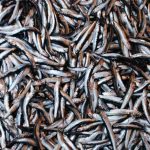Rebecca Asch, Nereus Program Senior Research Fellow at Princeton, has published a paper in the Proceedings of the National Academy of Sciences of the United States of America (PNAS) on “Climate change and decadal shifts in the phenology of larval fishes in the California Current ecosystem” (DOWNLOAD PDF).
Abstract:
Climate change has prompted an earlier arrival of spring in numerous ecosystems. It is uncertain whether such changes are occurring in Eastern Boundary Current Upwelling ecosystems, because these regions are subject to natural decadal climate variability, and regional climate models predict seasonal delays in upwelling. To answer this question, the phenology of 43 species of larval fishes was investigated between 1951 and 2008 off southern California. Ordination of the fish community showed earlier phenological progression in more recent years. Thirty-nine percent of seasonal peaks in larval abundance occurred earlier in the year, whereas 18% were delayed. The species whose phenology became earlier were characterized by an offshore, pelagic distribution, whereas species with delayed phenology were more likely to reside in coastal, demersal habitats. Phenological changes were more closely associated with a trend toward earlier warming of surface waters rather than decadal climate cycles, such as the Pacific Decadal Oscillation and North Pacific Gyre Oscillation. Species with long-term advances and delays in phenology reacted similarly to warming at the interannual time scale as demonstrated by responses to the El Niño Southern Oscillation. The trend toward earlier spawning was correlated with changes in sea surface temperature (SST) and mesozooplankton displacement volume, but not coastal upwelling. SST and upwelling were correlated with delays in fish phenology. For species with 20th century advances in phenology, future projections indicate that current trends will continue unabated. The fate of species with delayed phenology is less clear due to differences between Intergovernmental Panel on Climate Change models in projected upwelling trends.
READ MORE: Rebecca Asch








